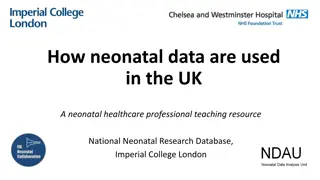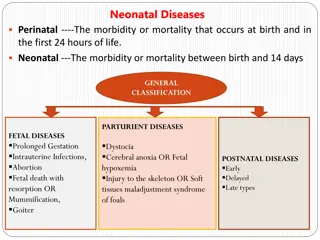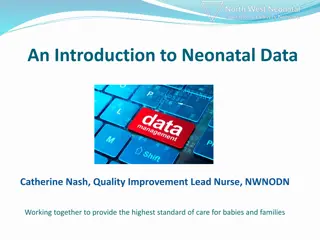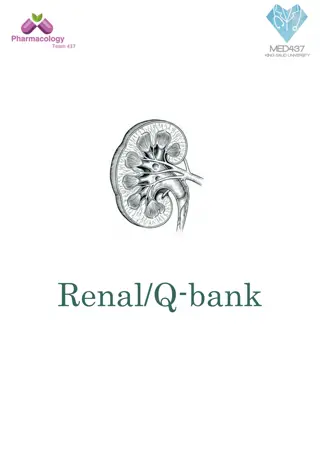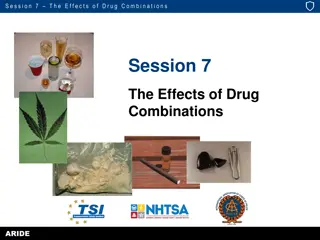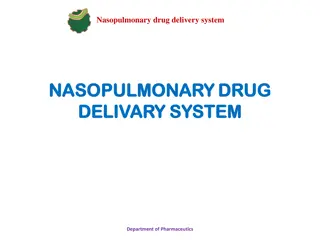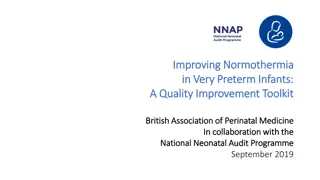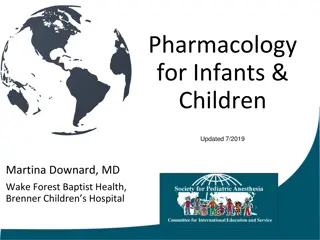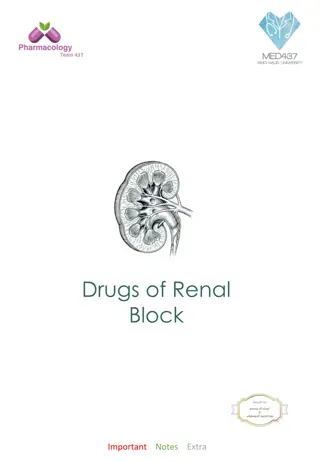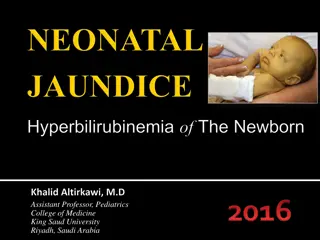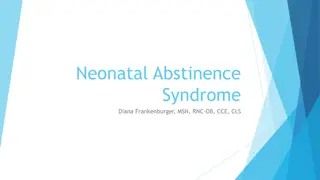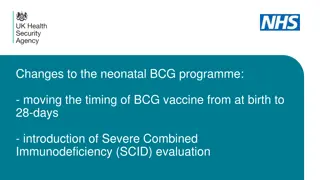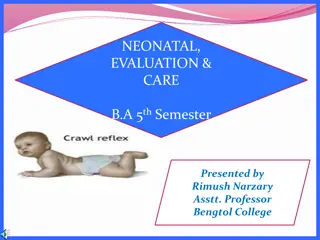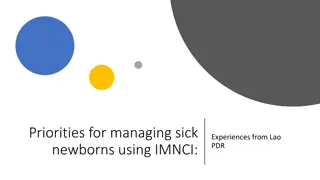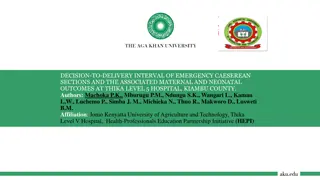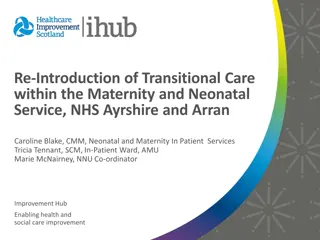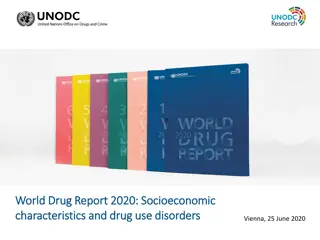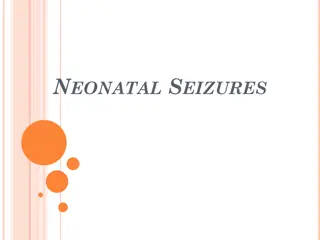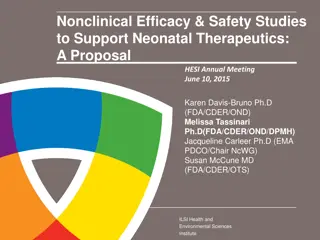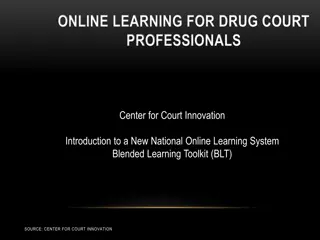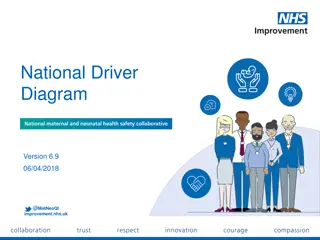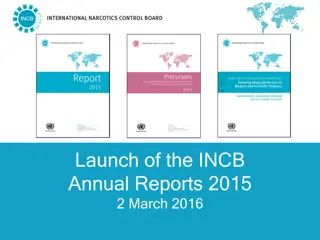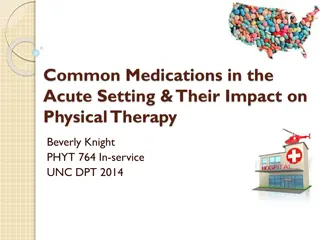Understanding Neonatal Data Usage in the UK Healthcare System
Neonatal data plays a crucial role in assessing the quality of care provided to newborns in the UK. This resource from the National Neonatal Research Database at Imperial College London sheds light on how neonatal data is collected, utilized, and shared among healthcare professionals. The importance
1 views • 24 slides
NEONATAL JAUNDICE
Neonatal jaundice, a common condition in newborns, results from elevated bilirubin levels. While often benign, high levels can lead to complications like kernicterus. Recognizing risk factors, limitations of clinical assessment, and appropriate evaluation and treatment are crucial in managing neonat
1 views • 48 slides
Neonatal Diseases
Neonatal and postnatal diseases in livestock, with a focus on perinatal, neonatal, and postnatal stages. It covers common classifications, causes, and risk factors associated with these diseases, particularly focusing on neonatal diarrhea (Calf Scour). The content delves into noninfectious and infec
0 views • 33 slides
Neonatal Data Collection and Utilization in Quality Care
Dive into the world of neonatal data with Catherine Nash, where the focus lies on the importance of collecting and utilizing data effectively to enhance care standards for babies and families. Discover how data systems like BadgerNet play a vital role in monitoring care, diagnosing treatments, measu
0 views • 7 slides
Polymeric Controlled Drug Delivery Systems
Polymeric controlled drug delivery systems play a crucial role in regulating drug release through diffusion, solvent penetration, and chemical mechanisms. These systems include diffusion-controlled, solvent-controlled, and chemically-controlled devices, each operating based on specific principles. S
0 views • 33 slides
Renal Pharmacology: Drug Excretion and Renal Clearance Questions
This comprehensive set of questions and answers covers topics related to drug excretion and renal pharmacology. It includes information on glomerular filtration, drug excretion mechanisms, dosage adjustments in renal impairment, factors influencing drug excretion, and the effects of long-term NSAID
0 views • 55 slides
Understanding the Effects of Drug Combinations in ARIDE Session 7
Dive into Session 7 of the ARIDE program to explore the prevalence of drug and alcohol use, the concept of polydrug impairment, and the potential effects of combining different substances. Learn about null effects, overlapping effects, and how various drug combinations can impact impairment indicato
0 views • 18 slides
Understanding Nasopulmonary Drug Delivery System
Nasopulmonary drug delivery system, utilizing the nasal route for drug administration, offers advantages such as hepatic first-pass metabolism avoidance and rapid drug absorption. This system is beneficial for pharmacologically active compounds with poor stability in gastrointestinal fluids. While i
0 views • 35 slides
Understanding Physicochemical Properties of Drugs
The physicochemical properties of drugs play a crucial role in their pharmacological effects. These properties include physical and chemical characteristics that influence interactions with biomolecules. Solubility, partition coefficient, and dissociation constant are key factors affecting drug beha
1 views • 46 slides
Quality Improvement Toolkit for Improving Normothermia in Very Preterm Infants
This resource provides a comprehensive toolkit developed by the British Association of Perinatal Medicine in collaboration with the National Neonatal Audit Programme to assist clinicians in neonatal units in delivering normothermia to very preterm infants. It includes evidence-based interventions, d
1 views • 17 slides
Maternity and Neonatal Safety Improvement Programme Overview
The Maternity and Neonatal Safety Improvement Programme aims to enhance the quality and safety of maternity and neonatal units in England by reducing rates of maternal and neonatal deaths, stillbirths, and brain injuries. Through system-level project updates and regional collaborative efforts, the p
2 views • 70 slides
Pediatric Pharmacology Update: Perioperative Medications in Infants and Children
Gain insights on frequently used medications in the perioperative period for infants and children, including anesthesia medications. Explore pharmacokinetics, drug distribution in neonates, and the effects of common anesthesia agents on pediatric patients. Understand how immature kidney or liver fun
0 views • 43 slides
Neonatal Care at Lagos University Teaching Hospital (LUTH)
Lagos University Teaching Hospital (LUTH) is a tertiary referral center providing comprehensive neonatal care services. The facility has specialized units for inborn and outborn babies, offering advanced medical care, including neonatologists, resident doctors, nurses, and support staff. LUTH also h
0 views • 15 slides
Understanding Renal Block: Drugs, Excretion, and Treatment Essentials
Renal block plays a crucial role in drug excretion, with processes like glomerular filtration and tubular secretion affecting drug elimination. Factors like blood flow, physiochemical properties, and urine pH influence renal excretion of drugs. Competition between drugs for transporters can have ben
0 views • 10 slides
Understanding Neonatal Jaundice: A Guide for Medical Students
This presentation by Dr. Khalid Altirkawi, M.D., Assistant Professor of Pediatrics, aims to educate medical students on neonatal jaundice. The content covers metabolic pathways of bilirubin, types of jaundice, diagnostic tests, prevention, and treatment strategies. It provides valuable insights into
0 views • 52 slides
Importance of In-Vitro Dissolution Testing in Drug Assessment
In drug development, in-vitro dissolution testing plays a crucial role in evaluating drug release from tablets when in-vivo bioavailability studies are limited. By ensuring drug release is close to 100% and uniform batch to batch, these tests help assess drug availability and effectiveness. Regulato
11 views • 10 slides
Understanding Pharmacodynamics: Potency and Efficacy
Pharmacodynamics explores how drugs interact with receptors in the body, affecting the magnitude of drug effects based on concentration. Graded dose-response relationships, potency, and efficacy play key roles in determining drug efficiency. Potency reflects the amount of drug needed for a specific
0 views • 21 slides
Understanding Quantitative Aspects of Drug Action
Explore the quantitative aspects of drug action, including drug receptor binding, concentration binding curves, dose-response curves, and types of antagonism. Learn to relate drug concentration to receptor binding capacity and response produced. Discover how concentration binding curves and dose-res
0 views • 29 slides
Understanding Neonatal Abstinence Syndrome (NAS) and Opioid Crisis Impact
Neonatal Abstinence Syndrome (NAS) is a condition where infants experience withdrawal symptoms from exposure to drugs in utero, with a significant impact seen in regions like southeastern Kentucky due to the opioid crisis. This syndrome manifests through various short and long-term effects, necessit
0 views • 30 slides
Understanding Drug Abuse: Definitions, Effects, and Stages
Drug abuse is a serious issue involving various substances like prescription drugs, alcohol, and illegal drugs. This includes terms and definitions, effects on the body and mind, stages of addiction, and withdrawal symptoms. Factors influencing drug action and reasons for drug use are also explored.
5 views • 45 slides
Understanding Neonatal Seizures and Their Pathophysiology
Neonatal seizures are sudden changes in neurologic function of a newborn, involving motor, behavior, and autonomic functions. The pathophysiology includes delays in Na/K ATPase maturation, increased receptor density, and GABAergic transmission. Different types of seizures like subtle, clonic, tonic,
1 views • 24 slides
Changes to Neonatal BCG Programme: Updated Timing and SCID Evaluation
The Neonatal BCG Programme has undergone changes, including shifting the timing of the BCG vaccine administration from birth to 28 days and introducing Severe Combined Immunodeficiency (SCID) evaluation. This session aims to educate on the modifications for safe practice. The BCG immunization progra
1 views • 12 slides
Understanding the Neonatal Period: Care and Evaluation
The neonatal period, also known as the newborn stage, encompasses the first 28 days of a baby’s life, characterized by rapid changes and fragility. This crucial stage requires specialized care, with sub-divisions such as the Period of the Partunate and Period of the Neonate. Commonly, neonates may
0 views • 19 slides
Insights on Improving Newborn Care with IMNCI in Lao PDR
Under-5 mortality rates are showing improvement, yet neonatal mortality lags behind. Addressing this requires a focus on neonatal care, particularly through the implementation of IMNCI protocols. The use of IMNCI can enhance the management of sick newborns, reduce neonatal deaths, and improve overal
0 views • 16 slides
Maternal and Neonatal Healthcare Insights
The data highlights key components, operational aspects, major causes, and timing of maternal and neonatal deaths. It emphasizes the critical period around delivery for both mothers and babies, stressing the need for interventions during this vulnerable time to reduce mortality rates. The informatio
0 views • 28 slides
Decision-to-Delivery Interval of Emergency Caesarean Sections and Maternal/Neonatal Outcomes at Thika Level 5 Hospital
Decision-to-Delivery Interval (DDI) study at Thika Level 5 Hospital examined 419 EMCS cases. The median DDI was 248 minutes, with 91.6% exceeding 75 minutes. Maternal complications were 6%, neonatal complications included MAS, RDS, birth asphyxia, and perinatal deaths. Prolonged DDI was associated w
0 views • 9 slides
Enhancing Transitional Care in Maternity and Neonatal Services at NHS Ayrshire and Arran
This project focused on reintroducing transitional care within the Maternity and Neonatal Service at NHS Ayrshire and Arran, aiming to enhance family satisfaction, reduce term admissions to the Neonatal Unit, and improve the overall care provided to families. Key strategies included changes in ward
0 views • 10 slides
Neonatal Admission Study: Understanding Risk Factors in Midwifery Settings
Neonatal Admission Study led by Dr. Rachel Rowe aims to investigate the admission of babies to neonatal care following birth in midwifery units. The study focuses on identifying risk factors and potential improvements in outcomes. The case-control study involves monthly data collection for 12 months
0 views • 10 slides
Impact of Socioeconomic Conditions on Drug Use Disorders: Insights from World Drug Report 2020
The World Drug Report 2020 highlights the strong correlation between socioeconomic factors and drug use disorders. Studies reveal that communities facing poverty, violence, and social inequality are at a higher risk of drug overdoses and addiction. Factors like income inequality, lack of social capi
1 views • 17 slides
Understanding Neonatal Seizures and Differentiating from Jitteriness
Neonatal seizures are a critical sign of neurologic dysfunction in newborns, with various types such as subtle, clonic, tonic, spasms, and myoclonic seizures. The immature brain's excitability and differences from the mature brain predispose neonates to seizures. Generalized clonic seizures are rare
0 views • 17 slides
Join Trick-or-Treat for UNICEF to Eliminate Maternal and Neonatal Tetanus
Key Club and UNICEF are collaborating through Trick-or-Treat for UNICEF to help eradicate Maternal and Neonatal Tetanus (MNT). This initiative has raised over $175 million since 1950. Maternal/Neonatal Tetanus affects millions globally due to unsanitary birthing conditions. Learn how to get involved
0 views • 5 slides
Understanding Targeted Clinical Investigation in Pharmacovigilance
Targeted clinical investigation plays a crucial role in pharmacovigilance by further evaluating significant risks identified in pre-approval clinical trials. This involves conducting pharmacokinetic and pharmacodynamic studies, genetic testing, interaction studies, and large simplified trials to ass
0 views • 12 slides
Advances in Ophthalmic Drug Delivery Systems
This content explores various advanced ophthalmic drug delivery systems including erodible ophthalmic inserts, soluble ocular drug inserts, new ophthalmic drug delivery systems, and bioadhesive ophthalmic drug inserts. These innovative systems aim to provide accurate dosing, prolonged drug release,
0 views • 8 slides
Challenges in Supporting Neonatal Therapeutics: A Proposal Overview
Proposal presentation at HESI Annual Meeting discusses challenges in neonatal therapeutics, including off-label drug use in NICU, low clinical relevance in studies, and barriers to conducting neonatal trials. Mandates require inclusion of neonates in pediatric studies, but priorities and study desig
0 views • 22 slides
Innovative Online Learning for Drug Court Professionals
Center for Court Innovation has introduced a new National Drug Court Online Learning System aimed at assisting drug court professionals. This system offers free access to web-based training, expert video lessons, virtual site visits to drug treatment courts, practitioner interviews, and a resource l
0 views • 8 slides
Enhancing Maternal and Neonatal Healthcare Improvements
This initiative aims to improve the safety and outcomes of maternal and neonatal care in England by reducing unwarranted variations, providing high-quality healthcare experiences, and enhancing systems and processes for better care. Key focuses include promoting smoke-free pregnancies, optimizing ca
0 views • 7 slides
Understanding Drug Testing Policies in the Workplace
The Drug-Free Workplace Act of 1988 mandates federal grant recipients to implement zero-tolerance drug policies to maintain a drug-free environment. Employers must establish clear policies, conduct awareness programs, offer counseling and rehabilitation services, and impose penalties for violations.
0 views • 19 slides
Overview of International Drug Control Efforts and Challenges in 2015-2016
The content highlights significant events related to international drug control efforts, emphasizing the launch of the INCB Annual Reports, the UNGASS session at the United Nations, and the focus on health, welfare, and challenges in combating drug abuse. It discusses issues such as new psychoactive
0 views • 13 slides
Analgesic Study with Three Treatments Crossed with Gender
This study explores the effects of analgesic treatments crossed with gender on pain levels. The data analysis includes factors such as gender and drug type, and the statistical model examines pain index as a linear function of factor levels. The ANOVA results indicate significant effects of gender,
0 views • 17 slides
Medications in Acute Care: Impact on Physical Therapy
Side effects of medications in the acute setting can manifest as impairments in various body systems, including integumentary, musculoskeletal, cardiovascular/pulmonary, and neuromuscular systems. Factors influencing adverse drug events include pharmacokinetics, drug interactions, and patient-specif
0 views • 24 slides
